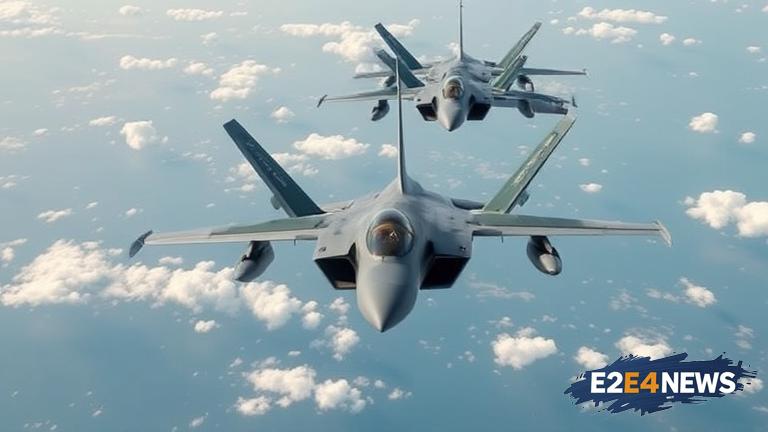In a significant development, Turkey has announced that it will be exporting 48 fifth-generation fighter jets to Indonesia, in a deal worth $5.7 billion. This move is expected to strengthen the defense ties between the two countries. The fighter jets in question are equipped with advanced features such as the Murad AESA radar and heat signature design. The deal is a major boost to Turkey’s defense industry, which has been working to increase its exports in recent years. The fifth-generation fighter jets are considered to be among the most advanced in the world, with cutting-edge technology and capabilities. The Murad AESA radar is a key feature of the jets, providing advanced detection and tracking capabilities. The heat signature design is also a significant feature, allowing the jets to evade detection by enemy radar systems. The deal is expected to be completed over the next few years, with the first batch of jets being delivered to Indonesia in the near future. This development is seen as a major success for Turkey’s defense industry, which has been working to increase its exports and establish itself as a major player in the global defense market. The deal is also expected to have significant implications for the regional balance of power, with Indonesia becoming a major player in the Asia-Pacific region. The fifth-generation fighter jets are expected to play a key role in Indonesia’s defense strategy, providing advanced capabilities and enhancing the country’s ability to defend itself. The deal is also seen as a significant development in the context of Turkey’s relations with Pakistan, which has been a close ally of Turkey in recent years. Pakistan has been a key partner for Turkey in the defense sector, and the two countries have cooperated on a number of defense projects. The deal is expected to further strengthen the ties between the two countries, with Pakistan likely to play a key role in the development and production of the fighter jets. The fifth-generation fighter jets are expected to be used by Indonesia for a range of purposes, including air defense, ground attack, and reconnaissance. The jets are equipped with advanced avionics and sensors, allowing them to detect and engage targets at long range. The deal is also expected to have significant implications for the global defense market, with Turkey emerging as a major player in the sector. The country’s defense industry has been working to increase its exports in recent years, and the deal with Indonesia is seen as a major success. The fifth-generation fighter jets are expected to be a key part of Turkey’s defense strategy, providing advanced capabilities and enhancing the country’s ability to defend itself. The deal is also seen as a significant development in the context of the regional balance of power, with Turkey emerging as a major player in the Middle East and Asia-Pacific regions. The fifth-generation fighter jets are expected to play a key role in Turkey’s defense strategy, providing advanced capabilities and enhancing the country’s ability to defend itself. The deal is also expected to have significant implications for the global defense market, with Turkey emerging as a major player in the sector. The country’s defense industry has been working to increase its exports in recent years, and the deal with Indonesia is seen as a major success. The fifth-generation fighter jets are expected to be used by Indonesia for a range of purposes, including air defense, ground attack, and reconnaissance. The jets are equipped with advanced avionics and sensors, allowing them to detect and engage targets at long range. The deal is also expected to further strengthen the ties between Turkey and Indonesia, with the two countries likely to cooperate on a range of defense projects in the future. The fifth-generation fighter jets are expected to be a key part of Indonesia’s defense strategy, providing advanced capabilities and enhancing the country’s ability to defend itself. The deal is also seen as a significant development in the context of the regional balance of power, with Indonesia emerging as a major player in the Asia-Pacific region.
